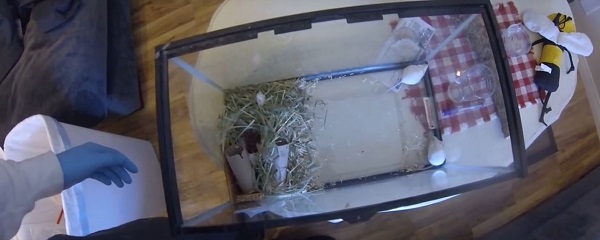House mice are rodents that are nocturnal (meaning, they are active during the night) and incredibly hungry. Their
hunger in food also translates into mating, which means that they become sexually active as soon as a month after
birth and then reproduce throughout the year.

House mice communicate with other members of his species with urine. Dominant male will spread his urine around his territory on a
daily basis so that all other male mice know to stay away from his territory and female mice on it, as he is the only one to fertilize them.
Male mouse smells female pheromones during the mating period and will hurry to impregnate her, sending his mating call to her to attract
female attention.
As soon as female mouse is pregnant, he will move onto the next one. Female mouse will at that time prepare the nest. If you see chewed wiring,
pieces of paper and cut down insulation, you can be sure that female mouse is pregnant and preparing home for her babies. Pregnant female mouse
will deliver anywhere from 3 to 12 babies after approximately 3 weeks of pregnancy. Babies are blind, naked, weighing only about 1 gram. Babies
will open eyes and see after about 14 days and will get hair after about one week.
Mother mouse will then spend next 3 weeks feeding the babies, during which period babies are completely unable to care for themselves. Mother mouse is
protective of her babies, although it has been seen that female mouse eats her offspring in times when she can't find any other food source.
After 3 weeks of feeding and caring for them, babies are expected to start caring for themselves, because in less then additional 2 weeks they will be
adult mice, ready to reproduce themselves.
Young adult mice will move away after they grow up and mother doesn't feed them anymore. However, female mice will most likely stay nearby their mother's
territory. This is no wonder because dominant male mouse sees his male offspring as a threat, but doesn't feel that way about his female offspring.
Although mice can live up to 5 years as pets, life span in wilderness is much shorter, so house mice don't live much longer than 1,5 year. They will spend
their entire adult life mating and producing offspring. As soon as female mouse grows up her babies, she will be ready to breed again, which happens as soon
as 3-4 weeks after the delivery of a previous litter.
All this means that you can have very large mouse population in your home within just 12 months, if you don't think of prevention in advance. This means, you
need to prevent mice from entering your home, because if they get inside and start reproducing, you will easily have over 100 mice in your home within a year
and getting this many rodents from your home is more then demanding task. And the damage they can make-just imagine.
Go back to the
How to get rid of mice in the attic home page. You might also want to read about
how to kill mice and why the use
of snap traps is better than
mouse poison. Read an analysis of the different types of traps and how to use them on the
how to trap mice page.
Learn why
bait is not as important as trap type, placement and location. Also read a full analysis of
mouse repellent to understand why it
never works. If you see droppings and want to identify them, read the
mouse poop page. If you need to hire professional help, read about
how much does mouse removal cost?
or you can read this site to learn how to do it yourself. Feel free to email me about What is a house mouse’s mating habits?